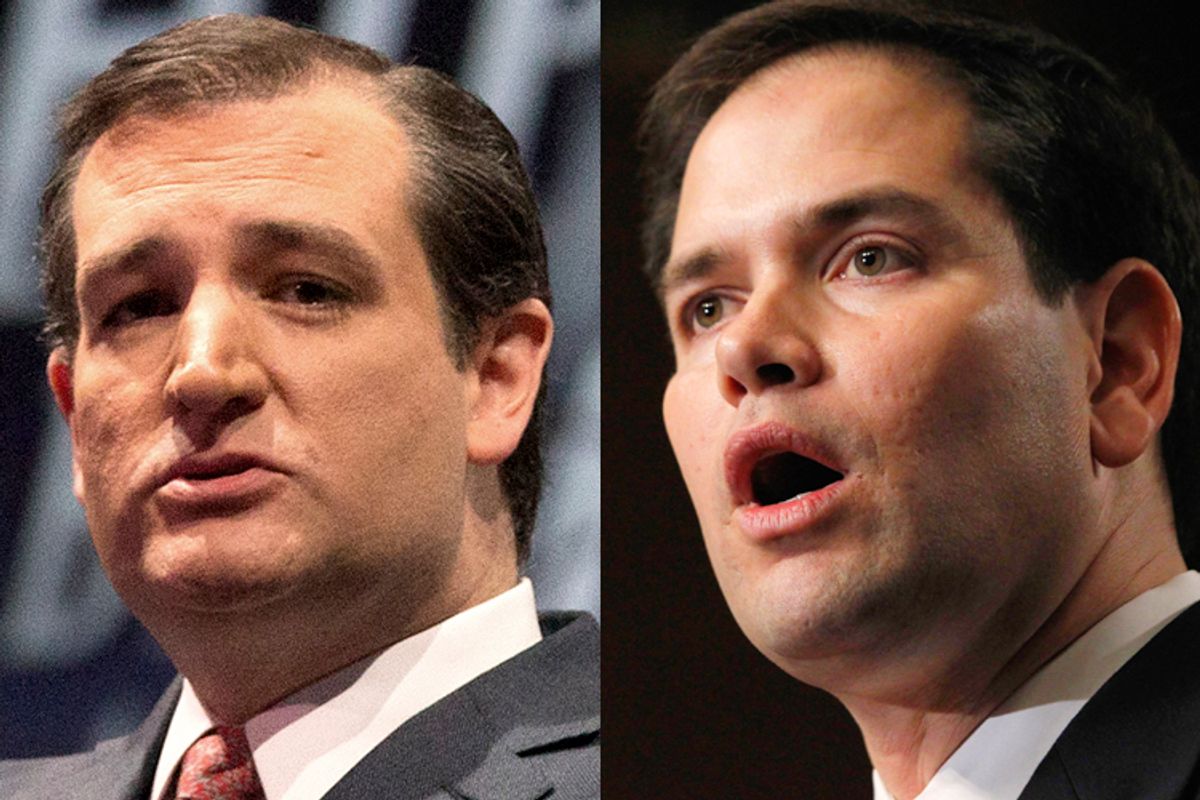The relatively new fight between Republican presidential contenders Marco Rubio and Ted Cruz has broken down along predictable lines, with each candidate attacking the other on their perceived weak points. Cruz lashes out at Rubio for helping to pass the 2013 bipartisan comprehensive immigration reform bill, and Rubio hits back at Cruz for voting to “weaken” national security with his support of the USA FREEDOM Act, which ended the bulk collection of metadata authorized by the Patriot Act. It’s a fight that reinforces existing narratives about the two candidates: Cruz has an edge on immigration (at least with conservatives), while Rubio is “stronger” on national security.
That’s why it was so interesting to see Cruz switch things up a bit this week and attack Rubio head-on over his national security judgment. In an interview with Bloomberg Politics’ Sahil Kapur, Cruz pointed out that Rubio backed the Obama administration’s 2011 intervention in Libya, which has not shaken out so well:
“Senator Rubio emphatically supported Hillary Clinton in toppling [Muammar] Qaddafi in Libya. I think that made no sense,” Cruz told Bloomberg Politics in a wide-ranging and exclusive interview during a campaign swing through Iowa. He argued that the 2011 bombings that toppled the Libyan leader didn't help the fight against terrorists. “Qaddafi was a bad man, he had a horrible human rights record. And yet ... he had become a significant ally in fighting radical Islamic terrorism.”
“The terrorist attack that occurred in Benghazi was a direct result of that massive foreign policy blunder,” Cruz said during a drive eastward from a town-hall event near Iowa City to another in the town of Clinton.
Cruz is absolutely right about Rubio’s vocal backing of the Libya mission – in March of 2011, Rubio wrote a letter to the Senate leadership insisting that the Senate vote to authorize Obama’s Libya action and make plain “that removing Muammar Qaddafi from power is in our national interest.” At the time, Rubio was heralded by neoconservatives for his “bold” leadership and for “fully embracing regime change as an explicit goal, thus providing a compelling clarity for American military action.” After Qaddafi was ousted and the country descended into a chaotic jumble of heavily armed militias and terrorist groups allied with the Islamic State, Rubio repositioned himself as a critic of what he called the Obama administration’s “isolationism” and “global retreat.” He tries to square his support for the war with its disastrous outcome by arguing that it would have worked if Obama had tried harder.
This gets to one of the annoying features of the 2016 presidential race: how certain candidates’ “strength” on foreign policy is often just assumed to be a given. In Rubio’s case, this assumption is based largely on Rubio’s repeated insistence that he’s strong on foreign policy, and the conflation of hawkishness with strength. Rubio talks a lot about America leading the world, he promises to lard up the defense budget, and he’s laying the groundwork for lengthy interventions in Iraq and Syria (and maybe even a bonus war with Iran). It’s all posturing that obscures the fact that Rubio’s policies and views on national security issues are frequently reductive, dangerous, contradictory, and wrong.
The same phenomenon redounds to Hillary Clinton’s benefit as well. National security is assumed to be an obvious strong suit for her, given her tenure in the State Department, her tendency towards hawkishness, and the fact that her opponents in the Democratic primary don’t have anything close to the experience she does. But she still defends the Libya intervention (which she pushed for aggressively on humanitarian grounds) and she’s aligned with the Republican presidential candidates who want to risk a military clash with Russia by establishing a no-fly zone over Syria.
This makes for some strange politics. Cruz is attacking Rubio by tying him to Hillary, which ordinarily would be a fairly effective jab in a Republican primary. But the GOP base these days seems much more inclined to favor candidates who spout interventionist rhetoric and promise to renew the Bush Doctrine as a curative to Obama’s “leading from behind.” This neocon revival is what ended up hamstringing Rand Paul’s presidential hopes. It’s possible that Cruz will have better luck making these attacks stick to Rubio, but it seems like it will be a hard sell.



Shares